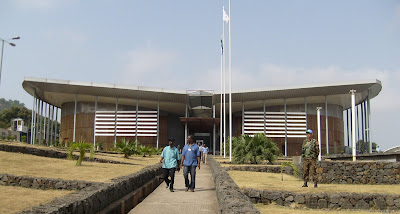
At exactly 2 p.m. today, before a packed gallery at the Special Court for Sierra Leone (SCSL) in Freetown, the presiding judge, Canadian Pierre G. Boutet, began reading the verdict in the case against three senior commanders of the Revolutionary United Front. Commonly referred to as the RUF trial, it is the international community's attempt at bringing to justice members of the main rebel faction in Sierra Leone's decade long civil war.
Established in 2002 by the United Nations and the government of Sierra Leone, the SCSL's mandate is to "try those who bear the greatest responsibility" for the atrocities perpetrated during the conflict. Contrary to other ad hoc international tribunals, such as the ICTR (Rwanda) and ICTY (Yugoslavia), the SCSL relies on donor countries' voluntary contributions, not on regular UN dues, to operate. Canada is among the Court's major funders.
The joint trial of Issa Hassan Sesay, Morris Kallon, and Augustine Gbao opened in July 2004. Foday Sankoh, the RUF's notorious leader, was also indicted on several counts, but he died while in custody.
After 308 days of audiences, 171 witnesses, and 32,096 pages of transcripts, the three-judge panel was finally ready to share its findings with the Sierra Leone people and the world. The reading of the summary judgment took just under two hours. The full version is expected to total more than 600 pages.
Each defendant stood accused of 18 counts of crimes against humanity, war crimes, and other violations of international humanitarian law. Specific charges included murder, extermination, abduction, rape, mutilation, pillage, enslavement, forced marriage, forced labour, attacks on UN peacekeepers, and the widespread recruitment and use of child soldiers.

Issa Hassan Sesay: guilty on 16 counts.

Morris Kallon: guilty on the same 16 counts.

Augustine Gbao: guilty on 14 counts, with a dissent from judge Boutet on 13 of them.
The verdict is especially significant for the future prosecution of combatants in civil conflicts, where warfare systematically targets civilian populations.
Count 8 refers to forced marriage as an "other inhumane act" that is distinct from sexual slavery. Chief Prosecutor Stephen Rapp calls it "the bush-wife phenomenon" or "conscripting women in the role of consorts to rebels" and argued successfully that the practice should be considered a crime against humanity that goes beyond repeated rapes.
Count 15 makes it a war crime to attack personnel involved in humanitarian assistance or peacekeeping. The SCSL and the International Criminal Court (ICC) are the only international tribunals to explicitly define this crime. Proceedings have begun at the ICC to arrest those responsible for last year's killing of 7 international peacekeepers in Sudan. Last week's bombing of 11 peacekeepers from Burundi in Somalia could bring forward another case. Devastated as he was by the execution of 10 UN peacekeepers in Rwanda 15 years ago, Roméo Dallaire will likely welcome this RUF verdict.
The sentencing hearing will take place next month. Two to three weeks later, both sides will be invited to submit appeal notices. The appeal phase itself will begin shortly thereafter. It is anticipated that the Appeal Chambre will render its decision before the end of the year.
The convicted RUF officers will join 5 other detainees currently held in individual cells built within the fortified SCSL compound. Where they will serve the rest of their respective sentences remains undecided. The president of Sierra Leone has expressed the desire to have them relocated outside the country. In Africa, Benin, Mali, Rwanda, and Swaziland have said that they would consider incarcerating them. Negotiations are underway.
In view of the spectacularly violent acts committed during the civil war, and keeping in mind that the conflict ended a mere six years ago, the atmosphere in the courtroom was surprisingly calm. Not one outburst, not one arm raised either in protest or in celebration. When it was all over, people filed out quietly and it was difficult to discern any feeling on their stern faces.
Scarring a generation's soul, they know, will never be recognized as an indictable offence.




No comments:
Post a Comment